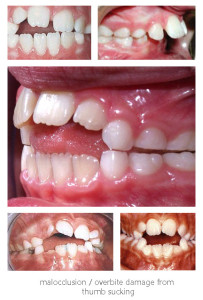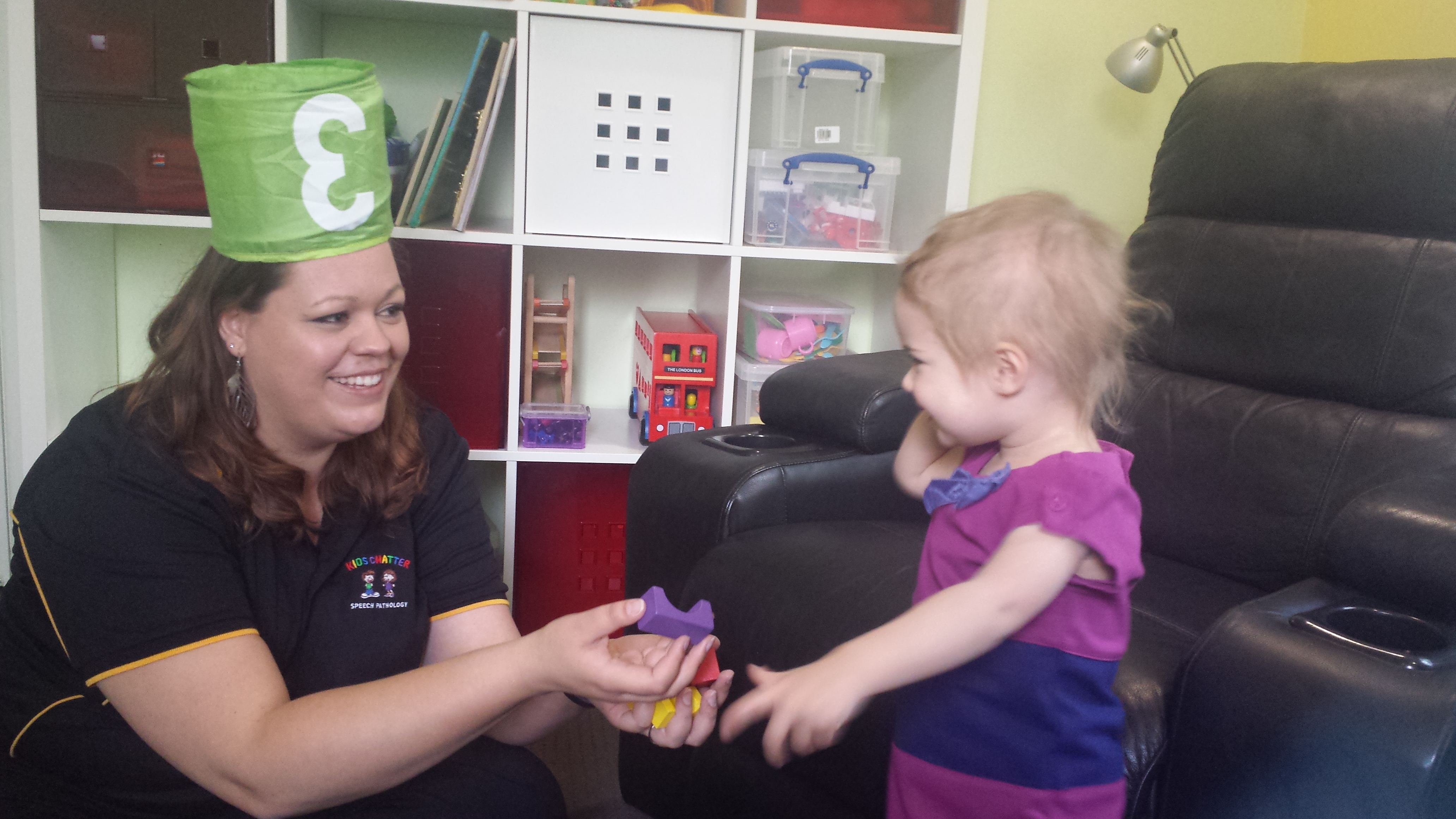
As a Speech Pathologist, probably the most common question that parents ask me, is “how many words should my child be saying?”.
You’ve probably noticed that there’s a big variety in development because you’ve seen other kids at your childcare centre, or kids at the park or even your own friend’s kids and some are talking a lot more and some are talking a lot less. So you’re probably questioning, well, what is normal? And if your toddler isn’t saying as much as their peers, you’re probably worried whether your child is behind for their age and would they catch up, or are they developing ok for their age.
Parents often ask their friends, their family or post in parent groups on Facebook asking whether they should be concerned about their child’s language development, and the common responses parents often receive are:
- “Don’t worry, they’ll grow out of it.”
- “They are fine. Every child develops at their own pace.”
- “Don’t worry, boys talk later than girls.”
- “My child didn’t say a word until she was 5 and then she started talking in full sentences overnight.”
- “Just send them to childcare and they’ll learn to talk there.”
- “Einstein didn’t speak until he was 4 and look at what he achieved.”
Sound familiar?
I  know this sort of ‘advice’ is well intentioned as most people just want to offer support and not make you worry any more, but this wait and see (and do nothing) approach can actually be quite detrimental in some cases. Now before you think I’m being over the top, let me help you by explaining what is considered normal/typical language development in children and what is not. I also want to explain the other developmental areas (besides just the number of words kids are saying) that we look at when it comes to a child’s communication development and more importantly WHY it’s so important to get it checked if there are concerns.
know this sort of ‘advice’ is well intentioned as most people just want to offer support and not make you worry any more, but this wait and see (and do nothing) approach can actually be quite detrimental in some cases. Now before you think I’m being over the top, let me help you by explaining what is considered normal/typical language development in children and what is not. I also want to explain the other developmental areas (besides just the number of words kids are saying) that we look at when it comes to a child’s communication development and more importantly WHY it’s so important to get it checked if there are concerns.
What is normal in a child’s early language development?
There are many markers in a child’s development that help us to work out if a child is delayed or if they’re on track with their development. Even though there will be some variety between children, typically developing children will follow the same sort of patterns within the same sort of age ranges.
Here is a breakdown of how many words children with typically developing language are using:
- By 12 months children say 2 – 6 words other than “Mum” or “Dad”.
- By 15 months children say 10 different words.
- By 18 months children say 50 different words.
- By 24 months children say 200 – 300 words.
- By 30 months children say 450 words.
- By 36 months children say 1,000 different words.
LinguiSystems Guide to Communication Milestones cites sources as Child Development Institute at www.childdevelopmentinfo.com. Nicolosi, Harryman, Kresheck (2006). Owens (1996).
Some parent will look at these numbers and think that their child isn’t saying as many words as they should, but because they understand everything that’s being said to them, they’re fine and will just catch up. Or because of the ‘advice’ that other people have given them as listed before, parents don’t think they need to worry because they will “just grow out of it”. Well, as a Speech Pathologist, this concerns me greatly. Not only is this advice given by people who are usually not trained professionals in early language development, but there are also a number of other factors to consider besides just how many words they are saying. There’s also the fact that parents (as well as some professionals), sometimes have a skewed perception of “normal” because we see so many children in our everyday interactions who have language delays and you may not even realise that they are in fact delayed. Speech Pathologist, Laura Mize explains this in further detail on her blog.
So what’s the risk? Don’t all kids learn to talk eventually?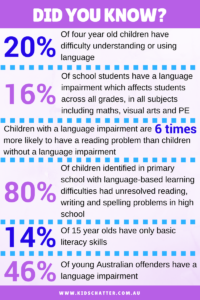
Well, most likely, yes, however, research has proven to us that
when communication delays are left untreated in early childhood, the risk increases exponentially for future academic and learning issues. Learning to use and understand language is essential for nearly every other kind of learning a child needs, not just learning as a toddler, but also as they get older. When children don’t catch up in their language skills, they have ongoing language difficulties well into their school years, including difficulties with their reading and writing. So waiting to see whether or not a child will catch up on their own, is something I know I wouldn’t want to risk for my child when early intervention can make a huge difference.
Although it’s true that children will develop at their own pace and that the precise ages at which children reach a specific milestone, will vary somewhat, speech and language development is actually quite consistent and follows predictable patterns. Therefore, if certain milestones haven’t been reached by certain ages, it becomes cause for concern and it’s important to find out WHY a child isn’t reaching them.
What are the reasons why a child may not be talking?
A child’s language may be delayed due to a number of possibilities:
- Some children don’t have as much of a need to use their words to communicate because parents get very good at anticipating or guessing their child’s needs (you know what they want before they have to ask you).
- An older sibling might be doing a lot of the talking for them, so once again, they haven’t needed to talk as much themselves because they still get their needs met.
- Some children are not getting enough exposure to language in their environment or the language around them is not used at an age appropriate level for them to learn sufficiently.
- Sometimes there could be more serious reasons as to why a child isn’t talking such as an undiagnosed hearing problem as a result of multiple ear infections over time, or a diagnosis of Autism or global developmental delays are also reasons as to why a child may not be talking.
Because there are a number of reasons as to why a toddler may not yet be talking, it is important to see a Speech Pathologist with experience in early language development to identify the cause of their language delay. Just counting the number of words they say is not the only factor in determining whether or not your child will be one of the lucky ones who may catch up in their own time, or whether they are the ones who need specific intervention to help them develop language because they won’t just grow out of it.
What key areas do we look for when seeing a late talker?
When we see a toddler who isn’t talking much, we look at a number of areas to determine whether or not they are a TRUE ‘late talker’ or whether or not there might be something else going on.
A true late talker is a specific set of children as described by the following:
- They are between the ages of 18 – 30 months
- They have good understanding of language
- They have typically developing play skills e.g. using toys appropriately, engage in pretend play
- They have normal development in their fine and gross motor skills
- They have normal thinking/cognitive skills
- Have good social skills
- Have limited spoken words
When we assess a child’s early language development, we look at the number and types of words a child may be saying, but we also look at the following skills to either rule out or confirm difficulties in other developmental areas:
- Interaction skills
- Do they want to interact with another person?
- Do they initiate some form of communication such as pointing to something or making a sound to get your attention?
- Eye contact
- Do they look at the person they are communicating with?
- Do they look at you while you are telling them something?
- Non-verbal communication – what are they
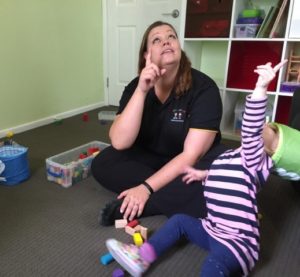 communicating without using spoken words?
communicating without using spoken words?
- Do they use gestures to communicate e.g. pointing to things, waving, pulling you towards the fridge if they’re hungry etc.?
- Do they use gestures to communicate e.g. pointing to things, waving, pulling you towards the fridge if they’re hungry etc.?
- Attention and listening skills
- Do they respond to their name being called?
- Do they turn to the person talking to them or do they ignore them completely?
- Play skills
- What is the level of the child’s play?
- Do they know how to play with toys in the correct way e.g. build a tower with blocks and not just kick them around the room or just line up the blocks in a row?
- Do they engage in play with another child/adult?
- Do they get excited with trying new toys or show no interest at all because they’re fixated on one toy only?
- Understand language
- Do they understand what is said to them and follow instructions? Do they understand the words and phrases being used? There is a difference between situational understanding and understanding everything, so for example, if you fill the bath and say “let’s have a bath”, they don’t need to understand the specific words to be able to work out what’s going on.
- How do they get their message across?
- If they’re not using spoken words, how DO they get their message across e.g. gesturing (pointing, sign language) or do they throw tantrums and get frustrated or do they simply do nothing and move on to something else?
As you can see from the list above, there’s a lot more to communication than just the number of words being used. So when a child isn’t talking much, I cannot stress enough how important it is to seek advice from a Speech Pathologist to determine if a child is showing any other red flags in these areas of their development. We need to confirm which child is a true late talker who may grow out of it or needs a small amount of intervention with strategies to help develop their spoken language, versus a child who may have a more serious underlying diagnosis that will require a more in-depth treatment plan. Once we’ve worked out the missing pieces of the puzzle, we can help you and your child with their specific difficulties and prevent them from falling further behind in their development that will otherwise affect their academic success and everyday communication as they get older.
So if you have any concerns regarding your child or another parent is asking whether they should be concerned, please recommend them to speak to a Speech Pathologist as they are able to evaluate all the necessary developmental skills and give the best advice based on the child’s needs. To contact Kids Chatter, call us on 0432 735 044 if you have concerns about your child. We see lots of families in our clinic on a daily basis and have helped them with their language development. We know that early intervention works and using the right techniques and strategies can make a huge difference for your little one’s development.
Monique Speakman
BA, MSpPathSt, CPSP, MSPA
Speech Language Pathologist
Monique Speakman is a Paediatric Speech Pathologist in Brisbane with over 10 years experience, mother of a son and twin daughters, business owner and blogger. She aims to educate parents about child development and communication through the Kids Chatter Speech Pathology Blog and Facebook Page and to provide information and tips on anything to do with Speech Pathology.



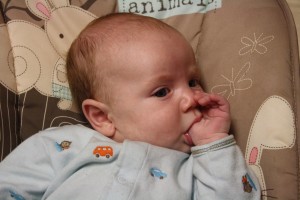 Thumb sucking can vary greatly between individual babies. Some babies suck their thumb often while other babies show little interest in doing so. The need for sucking tends to decrease around six months of age when they start eating solids and usually lessens or completely stops around 12 months of age. Thumb sucking is normally little cause for concern regarding dental development up to the age of 12 months. However, after the age of two, thumb sucking can be a problem.
Thumb sucking can vary greatly between individual babies. Some babies suck their thumb often while other babies show little interest in doing so. The need for sucking tends to decrease around six months of age when they start eating solids and usually lessens or completely stops around 12 months of age. Thumb sucking is normally little cause for concern regarding dental development up to the age of 12 months. However, after the age of two, thumb sucking can be a problem.